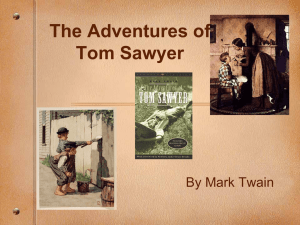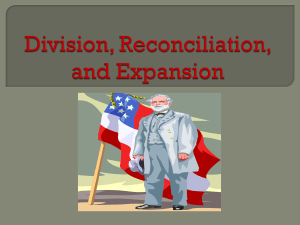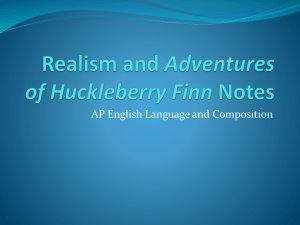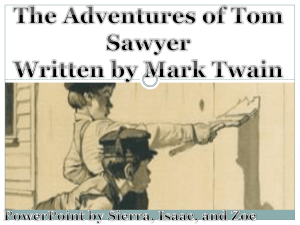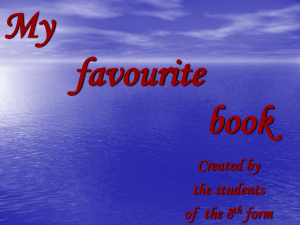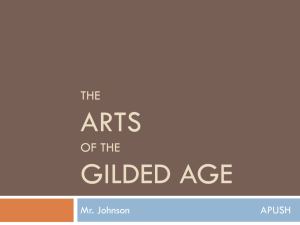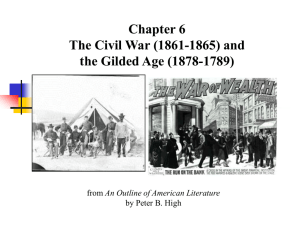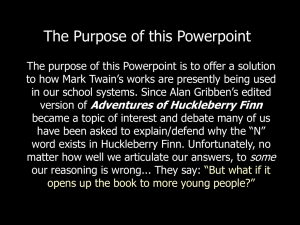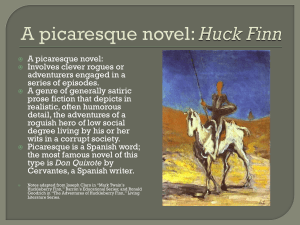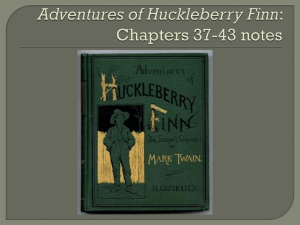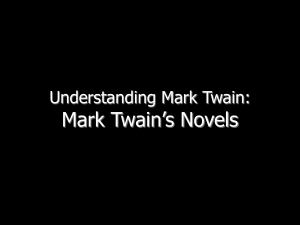Mark Twain
advertisement
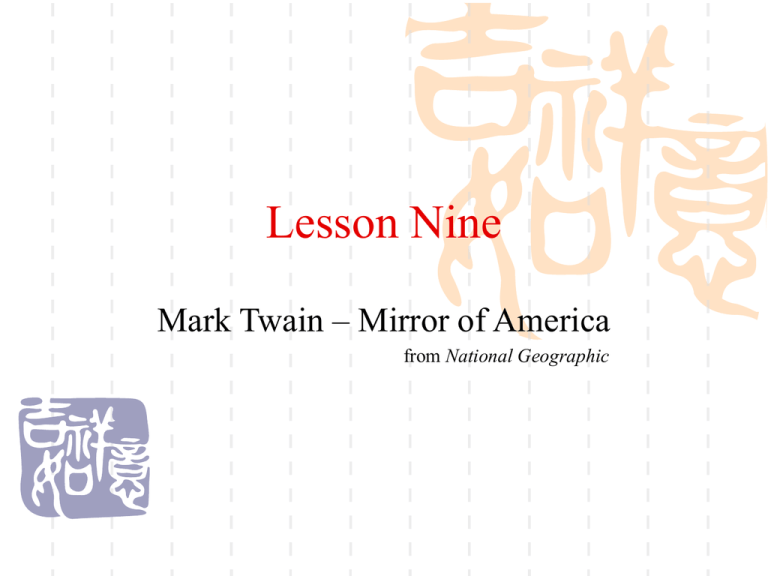
Lesson Nine Mark Twain – Mirror of America from National Geographic Ⅰ. Background Knowledge 1. Introduction of Mark Twain Mark Twain (1835-1910) is a great literary giant of America. He is called “the true father of America’s national literature.” His works were the most valuable contribution of frontier to American literature. His major stories were set in the Mississippi Valley when the river was the central national artery. Through his novels we know in detail the legend of the western movement. His themes called up the innocent morality of a life beyond social rule and genteel convention. So if there is an accurate word to describe Mark Twain, it is “authentic”, he is not only an authentic American, but also an authentic American writer, just like the title of this text “Mirror of America”. Mark Twain was the pen name of Samuel Langhorne Clemens (1835-1910). The phrase, meaning “two fathoms deep”, a unit for measuring the depth of water, was employed in making soundings on the Mississippi river boats. Among his well-known works are Innocents Abroad (1869), Tom Sawyer (1876), and Huckleberry Finn (1884-5?). 2. Analysis of the title Mark Twain – Mirror of American: It is a metaphor, and here “mirror” just means a person who gives a true representation or description of the country. Mark Twain if the mirror of America just means Mark Twain’s life and works are a mirror of the America of his time. 3. Introduction of his great works 1). Innocents Abroad: published in 1869, this account of a trip east to the Old World was a great popular success. Within its first year it sold over 70,000 copies, and it remained the best-selling of MT’s books throughout his lifetime. The book began as a series of travel letters written mainly for the Alta California, a San Francisco paper that sponsored MT's participation in the Quaker City trio to Europe and the Holy Land in 1867. Revising the letters into a book was suggested by Elisha Bliss, who published Innocents as a subscription book on July 20th, 1869. 2). The Adventures of Tom Sawyer: published in 1876, enjoying the story of Tom Sawyer as a mischievous young boy carries on under the watchful eye of his Aunt Polly. Mark Twain's Tom Sawyer is one part trickster, one escape artist and one part very lucky fellow! The Adventures of Tom Sawyer takes the reader along on a series of entertaining adventures and pranks while Tom's youthful romance with his sweetheart Becky Thatcher blooms in the background. The Adventures of Tom Sawyer is one of Mark Twain's most beloved works. 3). The Adventures of Huckleberry Finn: Throughout the twentieth century, this novel has become famous not only as one of Twain's greatest achievements, but also as a highly controversial piece of literature. In certain Southern states, the novel was banned due to its extensive criticism of the hypocrisy of slavery. Others have argued that the novel is racist due to the many appearances of the word "nigger." Unfortunately, the connotations of this word tend to override the novel's deeper antislavery themes, and prevent readers from understanding Twain's true perspective. In Twain's time, this word was used often and did not carry as powerful a racist connotation as it does currently. Therefore, in using the word, Twain was simply projecting a realistic portrayal of Southern society. Undoubtedly, The Adventures of Huckleberry Finn is highly significant due to its deep exploration of issues surrounding racism and morality, and continues to provide controversy and debate to this day, evidencing the continued relevance of these concepts. 4. notes: 1). Confederate guerrilla: a guerrilla fighter who supported the southern Confederacy. 2). the civil War: This refers to the American Civil War (1861-65), also called the War of Secession. This war was fought between the northern stated (Federal State or the Union) and the southern states (the Confederacy or confederate States of America) which seceded from the U.S. in opposition to the proposed abolition of slavery. The southern states were defeated. 3). Pacific slope: the west coast of the United States, which slopes down to the Pacific. 4). Philippine Moros: Moslems of Malay origin living in S. Philippines. 5). National Geographic: provides free maps, photos, videos and daily news stories, as well as articles and features about animals, the environment, cultures, ... Ⅱ. Questions after the detailed study of the text 1. Why is Mark Twain one of America’s best-loved authors? 2. Why did Samuel Langhorne Clemens adopt “Mark Twain” as his pen name? 3. When did Mark Twain become a pilot on a steamboat? How long did he stay there? What did he learn there? What effect did this experience have on his writing? 4. Why is Tom Sawyer as sure to be studied in American schools today as is the Declaration of Independence? 5. Why is Mark Twain called “Mirror of America”? Ⅲ. Analysis and Appreciation of the text 1. types of literature: a piece of biography 2. structure of the text Part 1 (para. 1-2) main comment on Mark Twain Part 2 (para 3-5) life on Mississippi River Part 3 (para 6-13) move west and begin to be a famous writer Part 4 (para 14-19) climax in his writing career Part 5 (para 20-22) personal tragedy Ⅳ. Rhetorical Devices 1. Antithesis: is the repetition of grammatically similar words of opposed or contrary meaning in similar sequences. Its effect is to achieve force, emphasis, humor as well as for emphasis. 1). Marriage has many pains, but celibacy (独身) has no pleasures. 2). Not that I loved Caesar less, but that I loved Rome more. (William Shakespeare, Julius Caesar) 3). Thou that sow (耕种) in tears shall reap in joy. (Bible) 4). When poverty comes in at the door, love flies out at the window. 5). Ask not what your country can do for you – ask what you can do for your country. (John F. Kennedy, “The Inaugural Address”) 6). From them all Mark Twain gained a keen perception of the human race, of the difference between what people claim to be and what they really are. 2. metaphor: 1). Most Americans remember Mark Twain as the father of Huck Finn’s idyllic cruise through eternal boyhood and Tom Sawyer’s endless summer of freedom and adventure. 2). ... a man who became obsessed with the frailties of the human race, who saw ahead a black wall of night. 3). The geographic core, in Twain’s early years, was the great valley of the Mississippi River, main artery of transportation in the young nation’s heart. 4). He went west by stagecoach and succumbed to the epidemic of gold and silver fever in Nevada’s Washoe region. 5). From the discouragement of his mining failures, Mark Twain began digging his way to regional fame as a newspaper reporter and humorist. 6). Mark Twain homed and experimented with his new writing muscles, but he had to leave the city for a while because of some scathing columns he wrote. 7). …a world which will lament them a day and forget them forever. 3. alliteration: 1). The cast of characters set before him in his new profession was rich and varied – a cosmos. 2). It was a splendid population – for all the slow, sleepy, sluggish-brained sloths stayed at home… 3). It was that population that gave to California a name for getting up astounding enterprises and rushing them through with a magnificent dash and daring and a recklessness of cost and consequences, which she bears unto this day… 4. euphemism: 1). He tried soldiering for two weeks with a motley band of Confederate guerrillas who diligently avoided contact with the enemy. 2). …he commented with a crushing sense of despair on men’s final release from earthly struggles. 5. personification: 1). … and when she projects a new surprise, the grave world smiles as usual, and says “well, that is California all over.” 2). America laughed with him. 3). Bitterness fed on the man who had made the world laugh. 6. irony: … I knew more about retreating than the man that invented retreating. 7. metonymy: … but making money, his pen would prove mightier than his pickax. 8. hyperbole: 1). Most Americans remember Mark Twain as the father of Huck Finn’s idyllic cruise through eternal boyhood and Tom Sawyer’s endless summer of freedom and adventure. 2). America laughed with him. Ⅴ. Detailed Study of the Text 1. idyllic: adj. an idyllic place or experience is extremely pleasant, beautiful or peaceful: an idyllic childhood/summer an idyllic village in the Yorkshire Dales 2. every bit as…as : equally as…as Opponents of the war are considered every bit as patriotic as supporters. This nation’s best-loved author was every bit as adventurous, patriotic, romantic, and humorous as anyone has ever imagined. 3. patriotic: adj. showing love for one’s country and pride in it: patriotic fervour/pride Many Americans felt it was their patriotic duty to buy bonds to support the war effort. n. patriot n. patriotism 4. cynical: adj. 1). believing that people are only interested in themselves and are not sincere: I think she takes a rather cynical view of men. I've always been deeply cynical about politicians. 2). describes a tendency to use someone's feelings or emotions to your own advantage: She works in that most cynical of industries - advertising. He praises my cooking but it's just a cynical ploy to get me to make his meals. 5. be/become obsessed with: unable to stop thinking about something; too interested in or worried about something: Why are people so obsessed with money? He was obsessed with the poverty. 6. frailty: noun 1 [U] weakness and lack of health or strength: Though ill for most of her life, physical frailty never stopped her from working. 2 [C or U] moral weakness: Most of the characters in the novel exhibit those common human frailties - ignorance and greed. Tolerant of human frailty in whatever form, she almost never judged people. 7. tramp printer: a person who goes around doing odd jobs of printing 8. starry-eyed: If a person is starry-eyed they have lots of thoughts and opinions which are unreasonably positive, so they do not understand things as they really are: It's easy to be starry-eyed about a place you've never been to. 9. acid-tongued: Tramp printer, river pilot, Confederate guerrilla, prospector, starry-eyed optimist, acidtongued cynic: the man who became Mark Twain was born Samuel Langhorne Clemens and he ranged across the nation for more than a third of his life, … 10. range across: travel across 11. artery: n. 1). one of the thick tubes that carry blood from the heart to other parts of the body: Hardening of the coronary arteries can lead to a heart attack. 2). an important road or railway line: the main arteries leading into London 12. molasses: n. a thick dark brown liquid made from sugar plants which is used in cooking 13. cub pilot: a young inexperienced pilot; a person just learning to become a pilot 14. cosmos: n. the universe considered as a system with an order and pattern 15. feud: n. an argument which has existed for a long time between two people or groups, causing a lot of anger or violence: a family feud a 10-year-old feud between the two countries a bitter feud over land 16. piracy: n. the crime of stealing things from ships while they are sailing 17. lynch: v. If a crowd of people lynch someone who they believe is guilty of a crime, they kill them without a legal trial, usually by hanging (= killing using a rope round the neck). 18. soak up: 1). If a dry material or substance soaks up a liquid, it absorbs the liquid through its surface: I tried to soak up most of the spilt milk with a cloth. 2). to understand and remember information well: Given the right environment, children are like sponges and will soak up information. 19. teem with: to contain large numbers of animals or people: The mall was teeming with shoppers that Saturday. teem: v. also teem down) UK to rain heavily: It's been teeming down all day. It's teeming with rain. 20. flotsam: n. 1). pieces of broken wood and other waste materials found on the beach or floating on the sea: We wandered along the shore, stepping over the flotsam that had washed up in the night. 2). anything or anyone that is unwanted or worthless: The homeless sleep in doorways and stations - we step over their bodies like so much human flotsam. 21. acquaint sb. with sth. : to make someone or yourself aware of something: Take time to acquaint yourself with the rules. be acquainted with sth to know or be familiar with something, because you have studied it or have experienced it before: Police said the thieves were obviously well acquainted with the alarm system at the department store. 22. dry up: 1). to dry plates, cups, etc. with a cloth after they have been washed 2). If a river, lake, etc. dries up, the water in it disappears. 3). If a supply of something dries up, it ends: His main source of work had dried up, leaving him short of money. 23. halt: v. to (cause to) stop moving or doing something or happening: "Halt!" called the guard. "You can't go any further without a permit." Production has halted at all of the company's factories because of the pay dispute. Security forces halted the demonstrators by blocking the road. 24. motley: adj. consisting of many different types and therefore appearing strange or of low quality: There's a motley assortment/collection of old furniture in the house we're renting at the moment. The people who turned up to the meeting were a motley crew (= a group consisting of many different types of people). 25. succumb to : 1). to lose the determination to oppose something; to accept defeat: The town finally succumbed last week after being pounded with heavy artillery for more than two months. I'm afraid I succumbed to temptation and had a piece of cheesecake. 2). to die or suffer badly from an illness: Thousands of cows have succumbed to the disease in the past few months. 26. epidemic: n. 1). the appearance of a particular disease in a large number of people at the same time: a flu/AIDS epidemic 2). a particular problem that seriously affects many people at the same time: a crime/unemployment epidemic 27. flirt with: 1). to consider doing something, but not seriously, or to be interested in something for a short time: I'm flirting with the idea of taking a year off and traveling round the world. 2). to intentionally put yourself in a dangerous, risky or difficult situation: Like a lot of young men, he flirts with danger. 28. colossal: adj. extremely large: In the centre of the hall stood a colossal wooden statue, decorated in ivory and gold. They were asking a colossal amount of money for the house. colossus: n. 1). a person or thing of great size, influence or ability: She has been described as the creative colossus of the literary world. 2). a very large statue or building: the Colossus of Rhodes 29. hotbed: n. a hotbed of sth. a place or situation where a lot of a particular activity, especially an unwanted or unpleasant activity, is happening or might happen: The police department was a hotbed of corruption. In the 60's the city was a hotbed of crime. 30. hone: v. 1). to sharpen an object: The bone had been honed to a point. 2). to make something perfect or completely suitable for its purpose: His physique was honed to perfection. 31. scathing: adj.severely and unkindly critical: scathing criticism He was very scathing about the report, saying it was inaccurate. 32. sluggish: adj. moving or operating more slowly than usual and with less energy or power: A heavy lunch makes me sluggish in the afternoon. Something is wrong with the car - the engine feels a bit sluggish. 33. scatter: v. 1): to (cause to) move far apart in different directions: The protesters scattered at the sound of gunshots. The soldiers came in and scattered the crowd. 2): to cover a surface with things that are far apart and in no particular arrangement: Scatter the powder around the plants. I scattered grass seed all over the lawn. 34. bet sb. some money = wager sb. some money I'll wager /bet you £5 that they'll get there first. 35. rebuff: v. to refuse to accept a helpful suggestion or offer from someone, often by answering in an unfriendly way: She rebuffed all suggestions that she should resign. 36. debunk: v. to show that something is less important, less good or less true than it has been made to appear: The writer's aim was to debunk the myth that had grown up around the actress. 37. mischievous: adj. 1). behaving in a way, or describing behavior, which is slightly bad but is not intended to cause serious harm or damage: She has a mischievous sense of humor. 2). expressing or suggesting mischief: a mischievous grin 3). describes behavior or words that are intended to cause harm or trouble: I think these rumors are mischievous. 38. deplore: v. to say or think that something is very bad: We deeply deplore the loss of life. He said that he deplored all violence. 39. clamor: v. to make a loud complaint or demand: The children were all clamoring for attention. She clamors to go home as soon as she gets to school. 40. robust: adj. (of a person or animal) strong and healthy, or (of an object or system) strong and unlikely to break or fail: He looks robust and healthy enough. a robust pair of walking boots 41. drown: v. to (cause to) die by being unable to breathe under water: He drowned in a boating accident. Many animals were drowned by the tidal wave. 42. moralize: v. to express judgments about what is morally right and what is wrong: his parents' self-righteous moralizing 43. that’s…all over That’s Peter all over. 44. crumble: v. 1 ).to break, or cause something to break, into small pieces: She nervously crumbled the bread between her fingers. The cliffs on which the houses are built are starting to crumble. 2). to weaken in strength and influence: Support for the government is crumbling. 45. lament: v. to express sadness and regret about: The poem opens by lamenting (over) the death of a young man. My grandmother, as usual, lamented the decline in moral standards in today's society. Ⅵ. Assignment 1. Write a summary of the life to Mark Twain within 200 words. 2. Words to dictation: idyllic, eternal, patriotic, cynical, bitter, obsessed, frailty, prospector, starry-eyed, artery, feud, piracy, soak, acquaint, diligently, hone, cosmos, sluggish, rebuff, debunk, lament, deplore, succumb, autobiography
